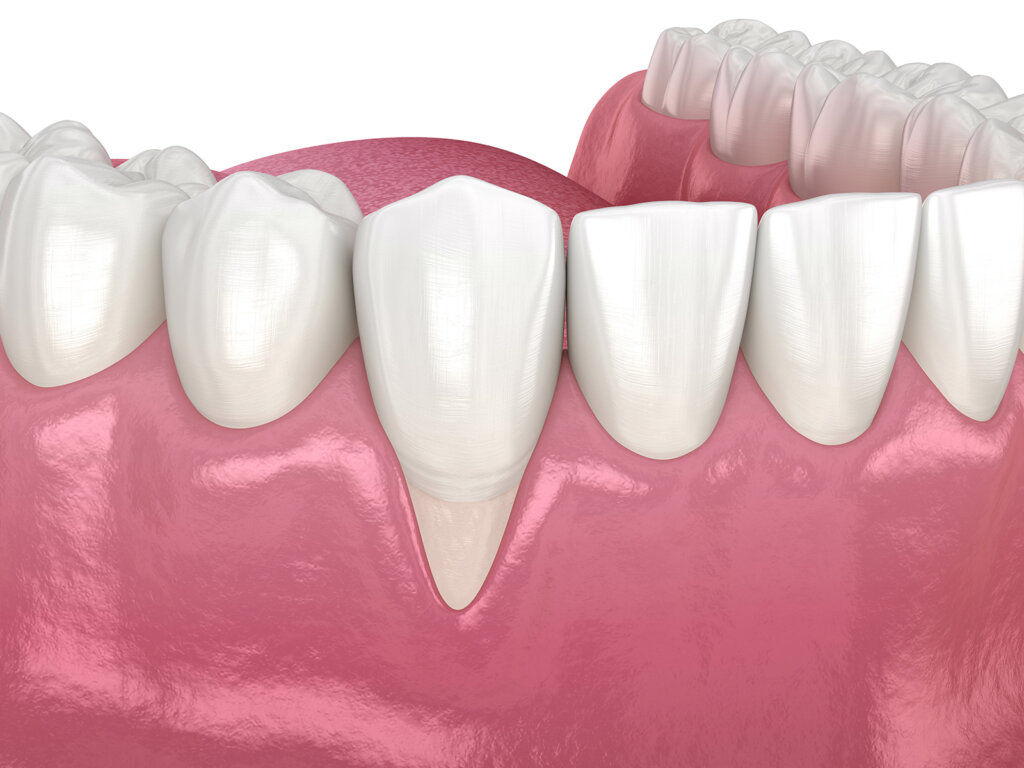
Although the gingival recession is commonly associated with elderly age, it can affect persons of all ages and poses major health hazards. Brushing your teeth too hard with a hard toothbrush is one of the most typical causes. This condition might be a sign of more severe gum disease.
When the roots of the teeth become exposed as a result of receding gums, the teeth are in danger of decay, infection, and loss. Gum recession can be slowed or even reversed if treatment is sought early on.
Various dental treatments are possible if the recession is significant and causes symptoms like tooth sensitivity, discomfort, or infection. Deep cleansing, infection treatment, and tissue transplants are among them. Gum recession is a common problem, yet many individuals are unaware that their gums are receding until it is too late.
What is Gum Recession?
When your gums pull back from your teeth, more of the tooth, including the roots, is exposed. Gaps grow between the gums and the teeth when this happens. Bacteria can breed in these spaces, producing periodontal disease and tooth decay. In severe situations, the infection can tear down the bone behind the tooth, resulting in tooth loss.
Gum recession is a slow process, and many people are unaware that they have receding gums until it’s too late. Gum recession can manifest itself in a variety of ways. Including red or swollen gums, foul breath, mouth sores, and tooth discomfort or bleeding when brushing or flossing.
What is Causing Gum Recession?
Gingival recession is caused by poor dental care and periodontal disease. Gum recession can, nevertheless, occur in those who maintain proper dental hygiene. The main causes of the recession are physical wear of the gums and inflammation of the tissues. Due to hereditary factors, certain persons are susceptible to receding gums. The location of the teeth and the thickness of the gums are two of these parameters.
Physical damage from dental cleaning or the use of strong brushes is another common cause of receding gums.Even when dental hygiene is generally acceptable, over-brushing promotes receding gums. The left side of the mouth is more commonly affected by this form of physical recession.
This is because most people brush their teeth with their right hand, putting more pressure on their left gums. On the side gums, the design is also more prominent than on the front.Lip or tongue piercings, misplaced teeth, and dental treatment damage are all physical causes that push the gums back.
What are Treatments for Gum Recession?
Gum recession is a condition that may be addressed in a number of ways. Your dentist will propose a treatment plan for you based on the severity of your sickness and the events that have occurred.
If your gums are receding due to gum disease, your dentist may offer scaling and deep planing, a non-surgical procedure. All plaque and tartar are removed from above and below the gum line during scaling. Your dentist will soften your tooth’s roots to aid healing, and do appropriate root planning.
Furthermore, they can assist in the reconnection of your gums to your teeth. Scaling and root correction may need several visits and may necessitate the use of a local anesthetic to alleviate any discomfort.
Your dentist may propose gum grafting to restore tooth and gum health if your gum recession is severe. Gum grafts are often used to treat severe gum recession. A little amount of tissue is extracted from your palate or another source and transplanted to the area where gum recession is present. Your gums and gums will then be mingled together, and the gums will gradually return to their original shape. When your graft heals, it will cover and protect the exposed tooth roots from decay.
You may have gum recession as a result of forceful brushing or using a hard toothbrush. In that case, your dentist will show you how to properly care for your teeth and gums without harming them. It will also suggest a toothbrush that is appropriate for you. If incorrectly applied prostheses are the cause of your gingival recession, the prostheses should be repaired. If not, they should be replaced with prostheses that are appropriate for the mouth anatomy and do not harm the gums.
Notify your dentist right away if you observe indications of gingival recession. Gum recession, like other disorders, may be treated easily and rapidly if caught early. Many popular drugs, including blood pressure medications, antidepressants, and antibiotics, can harm the soft tissues of the mouth. In such cases, the process is continued by switching to a different type of drug or changing the treatment method. There are also usually several options to treat the same medical conditions and symptoms.
How to Prevent Gum Recession?
Brushing teeth too hard or with a firm-bristled toothbrush is the most evident and preventive cause. Instead, people should clean their teeth gently with a soft-bristled toothbrush, avoiding overbrushing.
Periodontal disease is caused by plaque and tartar buildup, thus regular dental hygiene can help prevent receding gums. People who are concerned about their teeth or receding gums can schedule an appointment with Smile Team Turkey.
You can read our previous article from https://smileteamturkey.com/blog/between-acid-reflux-and-teeth/.
